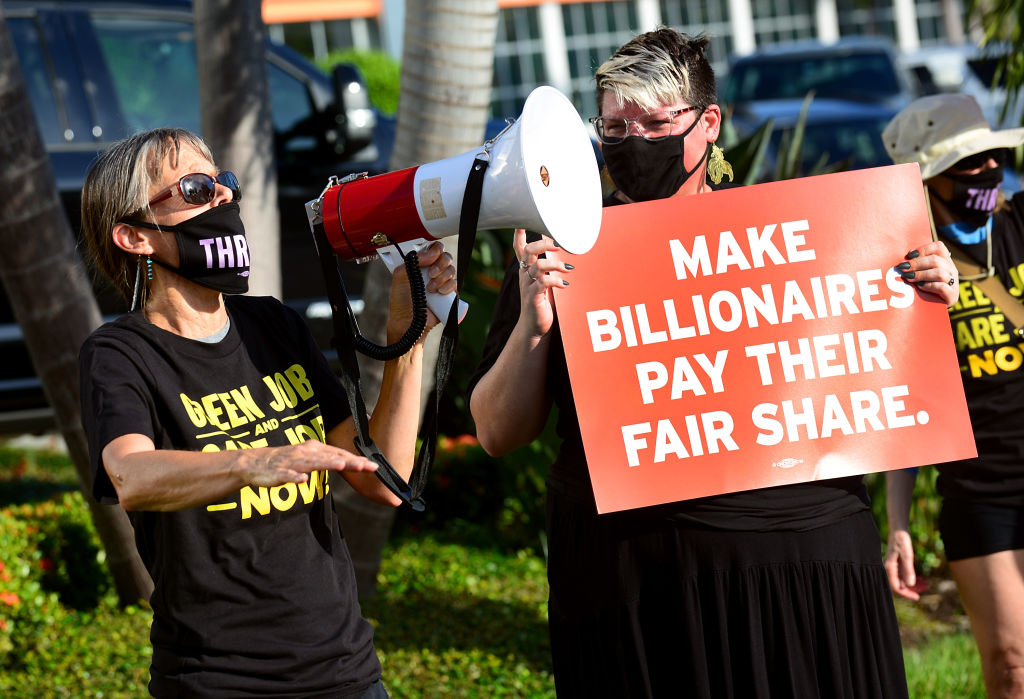The injustice of an inhuman religion
Socialist Investment Advisors

Republican-led states are finally taking aim at destructive ESG mandates.
The radical left’s domination of education, the media, and big cities has expanded to include corporations and large investment funds. Progressive-minded investment companies, pension funds, and employees are pressuring corporations to implement Environmental, Social, and Governance (ESG) policies.
The principal objectives of ESG include eliminating the extraction and use of fossil fuels in the pursuit of zero carbon emissions and combatting climate change; diversity, equity and inclusion (DEI) initiatives to advance non-white and LGTBQ+ employment, especially in senior management and including board composition; labor rights; programs, policies and investments that empower so-called marginalized minorities; and, often, the Boycott, Divestment, and Sanctions (BDS) campaign against Israel. Nearly 300 asset managers, holding $61.3 trillion of equity and debt assets, have taken the Net Zero Assets Managers Initiative pledge to manage “all assets under management to achieve net zero emissions by 2050 or sooner.” Achieving this pledge requires the fund managers to force compliance from the corporations in which they invest.
Seeing Green
The ESG movement started about 20 years ago and is gaining strength in the United State and Europe. It prioritizes a progressive political agenda over individual rights, capitalism, and profits. Unless approved by a corporation’s shareholders, or a fund’s investors, ESG may violate state law by depriving individuals of control over their capital and the rights that come from ownership of capital.
ESG’s proponents devote scant effort to reining in China, Venezuela, or other left-wing authoritarian governments. To them, enslaving and murdering Uyghurs, or sweat shops in developing nations, are par for the course; but, a tweet from a corporate executive opposing transgender participation in girls’ sports teams, or requiring an ID to vote, is a call to action.
Some corporations, such as Microsoft, Delta, Disney, and Nike, promote ESG without being pressured by their investors. Many others are pushed into ESG by activist institutional investors such as BlackRock, the world’s largest asset manager, with $10 trillion under management; CalPERS (the California public employee pension fund, with more than $469 billion under management); and Carlyle, which holds more than $376 billion.
The rules for securities offerings and trading are set by the federal government, but the requirements for forming and managing a corporation are largely determined by state law. Investment funds, including pensions, mutual funds, and index funds, are governed by a hybrid of federal and state law and regulations.
Shareholders vs. “Stakeholders”
After years of inaction, some state political leaders and attorneys general are finally pushing back, reminding the largest fund managers of their duties, and adjusting their investment and contracting policies. Under state law, members of a corporation’s board of directors and its officers have fiduciary duties to shareholders, and a fund manager has fiduciary duties to the fund’s investors. Fiduciary duties, including loyalty, care, and a duty to act lawfully, entail obligations and liabilities well beyond a standard contract.
The duty of loyalty requires the fiduciary to discharge its duties solely in the interest of its beneficiaries, i.e., shareholders and investors. Unless the shareholders of a corporation vote to change its purpose, with immaterial exceptions, the legally required purpose of the board and management of a public company is to maximize shareholder value. The mandated duties of a fund manager are to prudently comply with the investment criteria and goals described in the fund’s investor agreement or prospectus. Using a corporation’s or an investor’s funds to advance other goals impermissibly creates “mixed motives.” As Max Schanzenback and Robert Sitkoff, law professors at Northwestern and Harvard, recently explained in the Stanford Law Review, “Acting with mixed motives triggers an irrebuttable presumption of wrongdoing, full stop.”
The duty of care requires a fiduciary to act prudently, diligently, and after due consideration of the consequences of its actions. Promoting DEI, which in the corporate sphere often is unlawful, has been repeatedly enjoined by courts, reduces the quality of a corporation’s personnel and decisions, and engenders racial hatred), generally would not be a well-considered option for most public companies. Compelling a corporation to achieve net zero emissions by 2050 or sooner goes beyond any policies adopted by the United Sates or European Union. Further, as the International Energy Agency has observed, “In many cases, pledges have not yet been backed up by the strong and credible near-term policies needed to make them a reality.”
The duty to act lawfully includes not only the duty to adhere to the duties of loyalty and care, but to avoid participating in, let alone compelling, corporations to violate the law.
Fighting Back
Republican-led states are beginning to protect shareholders and investors from political agendas that are inimical to their state’s interests, and persistent breaches of fiduciary duty by the fund managers who are coercing corporations to engage in ESG.
The Florida State Board of Administration recently directed fund managers investing state funds to prioritize the highest return on investment, and to disregard the ideological agenda of the ESG movement. In August, 19 state attorneys general, led by Arizona’s Mark Brnovich, sent a letter to Laurence Fink, CEO of BlackRock, accusing the firm of using the “hard-earned money of our states’ citizens to circumvent the best possible return on investment, as well as their vote[s]” by actively pressuring corporations to pursue ESG policies, including energy policies that are contrary to the interests of their states.
The core of their concern is that BlackRock assured state pension funds that it would be a passive investor, but, instead, has taken a leadership role in organizations that advance ESG and is using those organizations and its $10 trillion of assets to bludgeon corporations to phase-out fossil fuels and adopt “the systemic change needed to alter the planet’s climate trajectory.” The attorneys general assert that BlackRock’s actions not only violate its fiduciary duties to investors, but also restrains trade in the energy sector in violation of the Sherman Antitrust Act. While the latter allegation may be a reach legally, the former appears dead on, and is a warning to all fund managers.
Last year, the Texas legislature prohibited the state from entering into banking contracts with financial institutions that boycott firearms or energy companies. Since then, Texas has banned BlackRock, BNP Paribas, UBS, and other financial institutions from doing business with the state. In July, West Virginia banned Blackrock, JPMorgan Chase, Goldman Sachs and others for their climate change efforts. Some states are excluding financial institutions engaged in ESG from bond deals, and several red states are considering divestment from companies that pursue ESG initiatives. Missouri has made an antirust claim against companies that are part of the BDS movement, and other states are considering doing so.
Blue states are heading in the opposite direction. For example, Maine has passed a law to divest the 200 largest publicly traded fossil fuel companies from its pension funds by 2026, and other blue states are considering similar actions involving fossil fuels and weapons manufacturers.
Securities regulators have embarked on a third course, sanctioning and fining fund managers and corporations that make excessive claims of pursuing ESG, sometimes called “greenwashing.” Last year, the Securities and Exchange Commission established a Climate and ESG Task Force to enforce disclosure requirements for public companies, and published a Risk Alert reminding investment advisers to accurately disclose their funds’ use of ESG in investment criteria and goals.
The U.S. Department of Labor is expected to issue rules in December on whether and how investment advisors can incorporate ESG in ERISA plans, which include all private employer retirement plans, such as pensions and 401(k) programs. Given the Biden administration’s “whole-of-government” executive order to embed DEI in all aspects of federal-government policies and American lives, and its multiple orders to prioritize combating climate change, it is inevitable that the Labor Department will authorize investment advisors to utilize strategies intended to require corporations to adopt ESG policies, regardless of the negative impact on the funds’ beneficiaries.
Progressive energy policies have been a major contributor to rampant inflation, and it is far from clear how electrical grids could support an all-electric vehicle policy; consumers could afford the cars and charging stations; relying on China for lithium carbonate and other minerals required for car batteries is prudent; or, the U.S. would dispose of tens of millions of batteries each year. Issues regarding workers’ rights and governance are far from settled, and involve core principles of capitalism. DEI is a disgraceful and unlawful violation of human dignity, and the American belief in individual rights and equality of opportunity. BDS may be an antitrust violation and is certainly antisemitic.
The core problem with ESG is not overstating its importance in securities disclosures by companies that give it mere lip service. The core problem is the companies that implement it, and the elite investment managers who compel them to do so—the law, and the returns and principles of their investors be dammed.
The American Mind presents a range of perspectives. Views are writers’ own and do not necessarily represent those of The Claremont Institute.
The American Mind is a publication of the Claremont Institute, a non-profit 501(c)(3) organization, dedicated to restoring the principles of the American Founding to their rightful, preeminent authority in our national life. Interested in supporting our work? Gifts to the Claremont Institute are tax-deductible.
The birthplace of environmentalism was built through meticulous application of technology.
The elite war on free enterprise.
Traditional household gardening provides a model of escape from a future of eating bugs and vat-produced mycoproteins.
When doing something is worse than doing nothing.
Climate apocalypse porn is a lever to impose a radical economic agenda.






